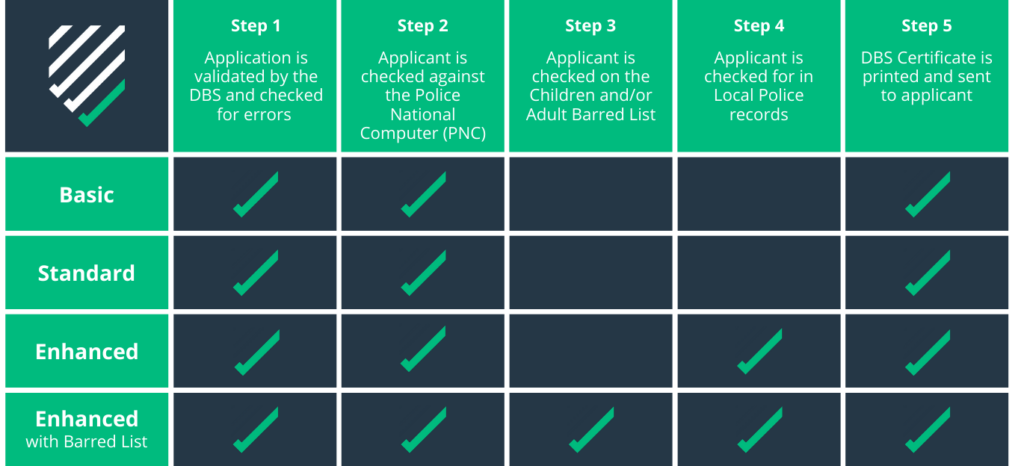Our focus is on providing an efficient and reliable service for ENHANCED DBS CHECKS, ensuring that your employees and volunteers can start their roles without delay.
Table of Contents
Comprehensive Screening for Sensitive Roles


The ENHANCED DBS CHECK is essential for individuals in sensitive positions, especially those working with children or vulnerable adults. It is a requirement for healthcare workers, caregivers, taxi license applicants, and individuals regulated by the Gambling Commission.
This check is the highest level of DBS screening available, providing a thorough review of a person’s criminal history. It covers both spent and unspent convictions, cautions, warnings, and relevant police information.
Additionally, it can include checks against the Children’s Barred List and Adult’s Barred List to identify any individuals prohibited from such roles. By conducting these rigorous screenings, we help ensure that only thoroughly vetted individuals are allowed in positions that require utmost care.
For an enhanced DBS check, recruiting organisations must go through an umbrella registered body like Aaron’s Department. We process hundreds of ENHANCED DBS CHECK applications daily, offering same-day processing, free registration, bulk discounts, and excellent customer service. Our pricing starts at just £10.95 per check (£7:30 if you buy in bulk!)
Roles Requiring ENHANCED DBS CHECKS
Organisations should only request an “Enhanced DBS check” on an individual when they are legally entitled to ask an individual to reveal their full criminal history. This is known as asking ‘an exempted question’. Enhanced DBS Checks are typically required for roles in various sectors, including:
- Healthcare Professionals: Doctors, nurses, first responders, and other medical staff who work directly with vulnerable adults or children in hospitals, care homes, or community services.
Education and Childcare Roles: Positions like teachers, teaching assistants, childminders, nursery staff, and Volunteers in youth organisations or sports clubs who work with children.
Social Work and Care Roles: Social workers, foster carers, and individuals in adult or child social care settings.
Personal Care: People providing personal care to adults due to illness, disability, or age-related needs.
Counsellors and Therapists: Professionals like counsellors and psychotherapists who offer services to vulnerable clients or Children.
Transport and Escort Services: Roles such as taxi drivers, patient transport staff or school bus drivers that involve transporting vulnerable adults or children.
The above list is a guide only, our application process has an integrated compliance system, so organisations can ensure they are legally entitled to ask an employee ‘an exempted question’. The Government also provides an online eligibility checker.
Can I legally ask “an exempted question”?
To ask someone to disclose their full criminal history in an “Enhanced DBS Check”, specific conditions must be met under the Rehabilitation of Offenders Act 1974. This is referred to as “an exempted question” which applies to certain roles involving vulnerable groups, specific licenses, or particular positions. For such roles, an Enhanced DBS Check is essential.
An Enhanced DBS Check provides a detailed criminal record, which is mandatory for positions involving work with children, vulnerable adults, or other protected groups. It is important to note that only employers or organisations, not individuals, can request an Enhanced DBS Check. The minimum age for requesting this check is 16 years. The Enhanced DBS Check replaced the Enhanced CRB Check in 2012, following changes in the Rehabilitation of Offenders Act 1974 (Exceptions Order 1975) and the Police Act 1997 regulations.
Read About “Enhanced DBS” EligibilityEnhanced DBS Check: Spent vs. Unspent Convictions
An Enhanced DBS Check is a thorough background check that reveals both spent and unspent convictions, impacting what individuals must disclose and when. Understanding the difference between these types of convictions is essential for roles involving vulnerable groups.
Unspent Convictions
Definition: Unspent convictions are those that are still within the rehabilitation period or will never become spent due to the severity of the offence.
Rehabilitation Period: This period varies based on the type and length of the sentence (e.g., fines, community orders, imprisonment) and starts from the conviction date or from the release from custody.
Disclosure in Enhanced DBS Checks: Unfiltered Spent convictions should appear in an Enhanced DBS Check.
Spent Convictions
Definition: A conviction becomes “spent” when the rehabilitation period ends without further offences. After this it should not appear on a Standard or Basic DBS check.
Rehabilitation Period: The duration depends on the sentence rather than the offence itself.
Disclosure in Enhanced DBS Checks: Spent convictions may appear in an Enhanced DBS Check, particularly for positions involving vulnerable individuals.
In summary, an Enhanced DBS Check can reveal both spent and unspent convictions, affecting what information must be disclosed for specific roles or legal purposes.
What Are Barred Lists?
There are two Barred Lists:
– The Adult’s Barred List.
– The Children’s Barred List.
Why are they important?
– If you are included on a barred list, then you will be breaking the law if you seek to work in regulated activity with a group from which you are barred.
– Likewise, employers will be breaking the law if they knowingly employ somebody who is on a barred list.
If needed, these checks are included in our ENHANCED DBS CHECKS at no extra cost.


How Much Does an ENHANCED DBS CHECK Cost?
| Official DBS Fee | Admin Fee | Total |
|---|---|---|
| £38.00 (Free for Volunteers) (1) | £10.95 (+VAT) £7:30 if you buy in bulk! (2) | £48.95 (+ Admin Fee VAT) As low as £7.30 for volunteers (3) |
(1) If your applicant is a volunteer, the DBS fee is lowered to £0.00.
(2) Free admin credit, is added to your account when you pay for checks in bulk!
(3) Organisations such as Charities who need an Enhanced DBS Check for a volunteer can combine them both to lower the total price for each Enhanced DBS check to just £7:30.
No sign up fees, no hidden costs.
Simply pay for what you need when you need it!
Customer service incredibly helpful. A pleasure to deal with Aaron’s Department.
What do ENHANCED DBS CHECKS Disclose?
An “ENHANCED DBS CERTIFICATE” will disclose the applicant’s spent and unspent convictions, final warnings, and reprimands.
It also includes any information that the local police deem relevant for disclosure (this is known as Local Police Information, though it rarely comes into play).
Additionally it will include the result of a check against one or both barred lists, if necessary.
Can I Apply for my own ENHANCED DBS CHECK?
Only an organisation or employer can submit an application for an ENHANCED DBS CHECK for their staff or volunteers, and only if they meet the DBS’s eligibility requirements. The only DBS check individuals can apply for themselves is a Basic DBS check.
Independent contractors and other self-employed workers who need an Enhanced check have different options based on their circumstances. For more detailed advice, visit our page: DBS Checks For Self Employed Workers
The 5 Stages of an ENHANCED DBS CHECK Application
After your application has left the Aaron’s Department system, your “Enhanced DBS check” can go through up to five stages:


What Does Aaron’s Department Offer?
- Seriously low admin fees, and free admin credit.
- Free-of-charge registration, and no hidden costs.
- A simple, automated process.
- An error-proof system, highlighting any potential mistakes.
- Professional and knowledgeable customer support.
- A built-in tracking system, as well as progress update emails.
- Fantastic services, that seamlessly integrate with each other.
Register your organisation to obtain an “ENHANCED DBS CHECK”
Enhanced DBS Check - Same Day Processing Guaranteed


Enhanced DBS Check, guaranteed processing the same day for £7.30. Free to sign up, no contracts, and humans answering support calls.
Service Type: Enhanced DBS Checks
Price: 7.30
Currency: GBP


Forward this page!


